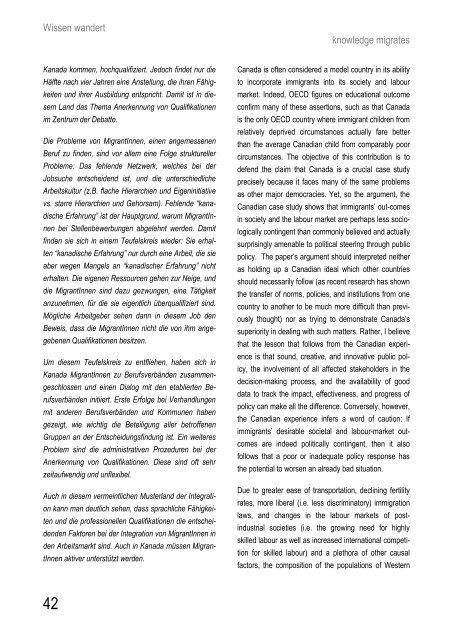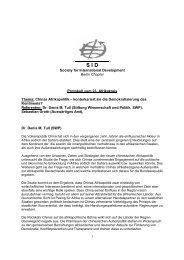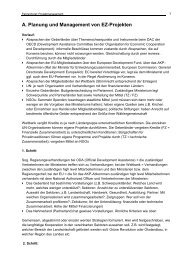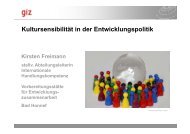Konferenzbericht (PDF-Dokument, 3 MB) - SID
Konferenzbericht (PDF-Dokument, 3 MB) - SID
Konferenzbericht (PDF-Dokument, 3 MB) - SID
Sie wollen auch ein ePaper? Erhöhen Sie die Reichweite Ihrer Titel.
YUMPU macht aus Druck-PDFs automatisch weboptimierte ePaper, die Google liebt.
Wissen wandert<br />
Kanada kommen, hochqualifiziert. Jedoch findet nur die<br />
Hälfte nach vier Jahren eine Anstellung, die ihren Fähig-<br />
keiten und ihrer Ausbildung entspricht. Damit ist in die-<br />
sem Land das Thema Anerkennung von Qualifikationen<br />
im Zentrum der Debatte.<br />
Die Probleme von MigrantInnen, einen angemessenen<br />
Beruf zu finden, sind vor allem eine Folge struktureller<br />
Probleme: Das fehlende Netzwerk, welches bei der<br />
Jobsuche entscheidend ist, und die unterschiedliche<br />
Arbeitskultur (z.B. flache Hierarchien und Eigeninitiative<br />
vs. starre Hierarchien und Gehorsam). Fehlende “kana-<br />
dische Erfahrung” ist der Hauptgrund, warum MigrantIn-<br />
nen bei Stellenbewerbungen abgelehnt werden. Damit<br />
finden sie sich in einem Teufelskreis wieder: Sie erhal-<br />
ten “kanadische Erfahrung” nur durch eine Arbeit, die sie<br />
aber wegen Mangels an “kanadischer Erfahrung” nicht<br />
erhalten. Die eigenen Ressourcen gehen zur Neige, und<br />
die MigrantInnen sind dazu gezwungen, eine Tätigkeit<br />
anzunehmen, für die sie eigentlich überqualifiziert sind.<br />
Mögliche Arbeitgeber sehen dann in diesem Job den<br />
Beweis, dass die MigrantInnen nicht die von ihm ange-<br />
gebenen Qualifikationen besitzen.<br />
Um diesem Teufelskreis zu entfliehen, haben sich in<br />
Kanada MigrantInnen zu Berufsverbänden zusammen-<br />
geschlossen und einen Dialog mit den etablierten Be-<br />
rufsverbänden initiiert. Erste Erfolge bei Verhandlungen<br />
mit anderen Berufsverbänden und Kommunen haben<br />
gezeigt, wie wichtig die Beteiligung aller betroffenen<br />
Gruppen an der Entscheidungsfindung ist. Ein weiteres<br />
Problem sind die administrativen Prozeduren bei der<br />
Anerkennung von Qualifikationen. Diese sind oft sehr<br />
zeitaufwendig und unflexibel.<br />
Auch in diesem vermeintlichen Musterland der Integrati-<br />
on kann man deutlich sehen, dass sprachliche Fähigkei-<br />
ten und die professionellen Qualifikationen die entschei-<br />
denden Faktoren bei der Integration von MigrantInnen in<br />
den Arbeitsmarkt sind. Auch in Kanada müssen Migran-<br />
tInnen aktiver unterstützt werden.<br />
42<br />
knowledge migrates<br />
Canada is often considered a model country in its ability<br />
to incorporate immigrants into its society and labour<br />
market. Indeed, OECD figures on educational outcome<br />
confirm many of these assertions, such as that Canada<br />
is the only OECD country where immigrant children from<br />
relatively deprived circumstances actually fare better<br />
than the average Canadian child from comparably poor<br />
circumstances. The objective of this contribution is to<br />
defend the claim that Canada is a crucial case study<br />
precisely because it faces many of the same problems<br />
as other major democracies. Yet, so the argument, the<br />
Canadian case study shows that immigrants‟ out-comes<br />
in society and the labour market are perhaps less socio-<br />
logically contingent than commonly believed and actually<br />
surprisingly amenable to political steering through public<br />
policy. The paper‟s argument should interpreted neither<br />
as holding up a Canadian ideal which other countries<br />
should necessarily follow (as recent research has shown<br />
the transfer of norms, policies, and institutions from one<br />
country to another to be much more difficult than previ-<br />
ously thought) nor as trying to demonstrate Canada‟s<br />
superiority in dealing with such matters. Rather, I believe<br />
that the lesson that follows from the Canadian experi-<br />
ence is that sound, creative, and innovative public pol-<br />
icy, the involvement of all affected stakeholders in the<br />
decision-making process, and the availability of good<br />
data to track the impact, effectiveness, and progress of<br />
policy can make all the difference. Conversely, however,<br />
the Canadian experience infers a word of caution: If<br />
immigrants‟ desirable societal and labour-market out-<br />
comes are indeed politically contingent, then it also<br />
follows that a poor or inadequate policy response has<br />
the potential to worsen an already bad situation.<br />
Due to greater ease of transportation, declining fertility<br />
rates, more liberal (i.e. less discriminatory) immigration<br />
laws, and changes in the labour markets of post-<br />
industrial societies (i.e. the growing need for highly<br />
skilled labour as well as increased international competi-<br />
tion for skilled labour) and a plethora of other causal<br />
factors, the composition of the populations of Western







